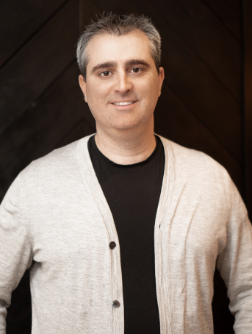This article was originally published in a sponsored newsletter.
Personal growth and business success are deeply interconnected. As someone immersed in the world of optometry, I recently found a book that reignited my passion for growth: The 6 Habits of Growth by Brendon Burchard.1 Burchard spent years studying high-performance coaching and describes six habits that lead to growth:
- Motivation
- Focus
- Confidence
- Energy
- Purpose
- Leadership
The dual applicability of these habits—enhancing personal well-being while also driving business success—attracted me to his principles. Let's delve into Burchard’s six habits and create practical applications from each that impact our business.
Motivation
Motivation is the fuel that keeps us going. It’s not something you have; it's something you generate. One way to generate lasting motivation is by raising your ambitions. Kobe Bryant didn’t say he wanted to be a good basketball player. He was the first person in the gym in the morning and the last to leave at night because he wanted to be the best in the world.
Practical Application: Elevate your practice goals. If your target revenue is $1M, why not aim for $3M? Such ambitious thinking can drastically change your daily operations and decision-making. Don’t just think about the 12 patients you’re going to see tomorrow; imagine what it looks like for multiple doctors to work simultaneously and propel your practice toward greater heights.
Focus
An eye care pun would be too easy here, wouldn’t it? Improve your focus by assessing and committing to improvements across various parts of life, including mental and physical health, finances and personal missions. Learn to keep your sights on the bigger picture of what matters in your life, not just on the minutiae that can distract you. (Let’s face it, the pun was inevitable.)
Practical Application: One specific habit Burchard advocates for is journaling. We often forget the many little steps we take toward our goals throughout the year, but journaling can help us document our successes and areas for improvement, both personally and professionally. In business, I suggest tracking KPIs (key performance indicators) in your practice. Shift the focus from end goals like revenue, to process-oriented goals, like the number of eye exams and capture rates. This approach helps cultivate habits that contribute to both personal well-being and business success.
Conflidence
Confidence is about turning self-doubt into a learning opportunity. It's recognizing that every moment of uncertainty is a chance to grow. Trust that you’ll be able to solve problems when they eventually appear.
Practical Application: We’ve all had times when a manager or associate has reacted negatively to our ideas. Confidence is acting anyway, knowing you’ll be able to tackle any issues. Find the one thing that you are afraid to do in your practice, whether that’s bringing in a luxury frame line, raising your exam prices or dropping the worst-performing manage care company. Have the confidence to try what you know is right, even if it’s scary.
Another way to exude confidence in the office is by meeting challenges head-on. Try speaking with a patient or team member who is upset. Actively listen and be authentic when you try to understand and solve their problem. This mindset can transform how you interact with patients and colleagues, fostering a more confident and competent practice.
Energy
You may find that meditation, exercise, a healthy diet and improving sleep fosters energy. Burchard reminds us to not only practice these techniques, but also to spend the energy we gain effectively.
Practical Application: The positive energy you bring to the office will motivate and inspire your patients and team. While you may be the catalyst, think about how your team can benefit from adopting your energy. Phil Jackson on the Chicago Bulls practiced breathing and meditation with his team and they went on to become world champions. At my former practice, Optix Family Eyecare, we often read an inspirational quote from a book in the mornings. The single minute that these messages took to read and share with staff brought energy to the team.
Purpose
Burchard encourages us not to have a singular purpose, but rather to integrate “points of purpose” into everyday life. These points provide opportunities for meaningful engagement and service. Remembering the people you impact with your decisions and work can be even more important than finding purpose for only yourself.
Practical Application: Help your team connect the dots between routine tasks and the joy of making a positive difference in someone’s life. Every emergency patient you squeeze in and every lens cleaned before it's dispensed all add up to something meaningful.
Leadership
Understand that you are a leader. Regardless of your role, you’re a leader in your family, your community and your office. Putting yourself in further leadership positions is one of the best ways to grow personally.
Practical Application: As a practice owner or manager, it is not about telling your team what to do. It's inviting them to participate in the process of creating goals. Burchard says people support what they create, so start facilitating meetings instead of dictating terms. Watch how your team steps up and thrives. Strong leadership in your practice can manifest in improved patient care, better team collaboration and a more cohesive practice environment.
The 6 Habits of Growth taught me more than just personal development strategies. It provides a holistic approach that, when implemented, intertwines personal growth with professional advancement in better patient care, increased efficiency and enhanced growth. Listen to the book yourself and make these six habits your own.
Reference:
1. Burchard B. The 6 Habits of Growth. Audible; 2022.




